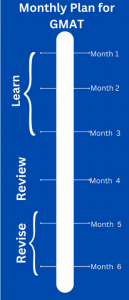A Comprehensive GMAT Study Plan For Working Professionals
As a working professional, you might wonder how it is possible to fit your preparation for the GMAT into your schedule, which includes a significant time devoted to your job. You can easily balance your GMAT preparation and your job by making a personalized study plan for GMAT. That means you should avoid any generic 3-month or 4-month study plan that has not taken your natural ability into account. In this article, we will discuss how to study for GMAT with a full-time job with a detailed monthly and weakly preparation plan.
Take Free GMAT 2023 Daily Targets
Subscribe To GMAT Preparation Channel
How To Study for GMAT with Full-time Job?
To make a good study plan tailored to your needs, you should consider the following:

Decide on a Target Score
You should set your target sectional scores according to your abilities. To know your abilities, you need to take a diagnostic mock test. After you assess your abilities in the mock test, you should set a high target in the section that you feel is your area of strength. You should also set a reasonable target in your weaker section to improve your score with practice.
Set a Deadline to Achieve the Target Score
While preparing for the GMAT, you should decide a time frame within which you would complete your preparation and give the test. This would also be a good time to book your final test date. A hard deadline will ensure that you follow your plan through and do not procrastinate. Your preparation time should range between 3 months to 6 months, depending on your level of preparation and how much you have to practice to reach your target score.
Source Your Study Material
It is important to source your study material from which you will be practising GMAT-level questions. Some of the quality content is available in the GMAT official guide 2023 on the GMAT Official Website. They also provide mock tests, which can also serve as a tool for learning and practising questions.
To ace GMAT, consistency is key, but it is difficult to practice extensively every day, covering all topics regularly while working. GMATPoint is an excellent source for working professionals because it provides free practice questions daily in the form of Daily Targets in verbal and quants, along with video solutions. It also ensures that you are in touch with all the topics of the GMAT regularly. All you need to do is devote 1 hour each day to ensure that you stay in touch with all the exam topics.
Monthly Study Plan For GMAT
After you have figured out all of the above, you should start chalking out the course of your preparation for the next few months. Here is an example of a long-term plan that you should make, which should serve as a rough guideline.

- Month 1: Take a diagnostic mock test, learn arithmetic
- Month 2: Mock 1, learn geometry
- Month 3: Mock 2, learn algebra
- Month 4: Mock 3, review QA
- Month 5: Mock 4, revision of weaker topics in QA
- Month 6: Mock 5, GMAT
This plan does not mention the other sections because they don’t have a defined syllabus. It is assumed that you will devote equal amounts of time to verbal as well and also practice AWA and IR regularly. You should create a monthly plan of your own and set deadlines to complete topics for every month. From this monthly plan, you will be able to prepare your weekly plans much more efficiently.
Weekly Study Plan For GMAT
If you start preparing with more than four months in hand, you can devote 2-3 hours daily on the weekdays, with an hour before you go to work and 2-3 hours after you return from work. On the weekends, you should be able to devote 3-4 hours, during which you are likely to give mock tests and analyze them properly.
Try to study for at least 1 hour in the morning because the mind will likely be fresh and ready for intensive activities like solving mock tests, which resemble the actual GMAT question paper in a time-bound environment.
Studying after work should include learning, revising, and practising known concepts, as your brain might be too tired for intensive activities. You should schedule your mocks on the weekends when you have a lot more time available at a stretch. Also, try to analyze the mocks as soon as you give them. This will help you identify your weaknesses a lot better.
Here is a weekly sample plan:
| Monday | Tuesday | Wednesday | Thursday | Friday | Saturday | |
| Before Work (1h) | GMAT Point Daily targets | GMAT Point Daily targets | GMAT Point Daily targets | GMAT Point Daily targets | GMAT Point Daily targets | Give a Mock (3h) and Analyse |
| After Work (2h) | Practice Critical Reasoning | Practice RC | Practice quants (PS & DS Questions) | Practice quants (PS & DS Questions) | Practice SCs, Practice Quant questions |
Remember, the most important thing is to stay consistent and persistent in studying. Even if you have a busy schedule, with a solid study plan, you can achieve your goal of acing the GMAT. If you need further help or guidance regarding the exam, please reach us at support@gmatpoint.com.
If you are starting your GMAT preparation from scratch, you should definitely checkout the GMATPOINT
